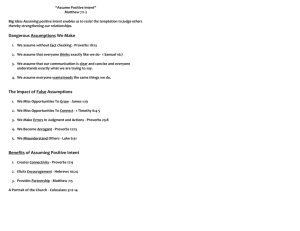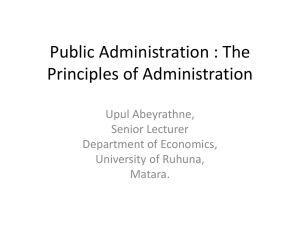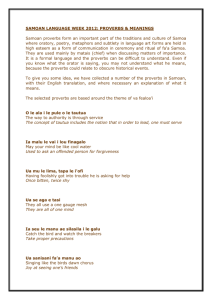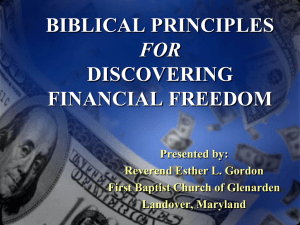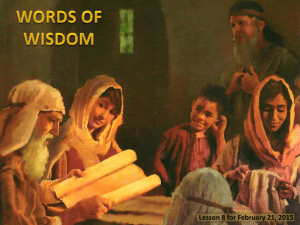journal of PRAGMATICS - University of Ilorin
advertisement
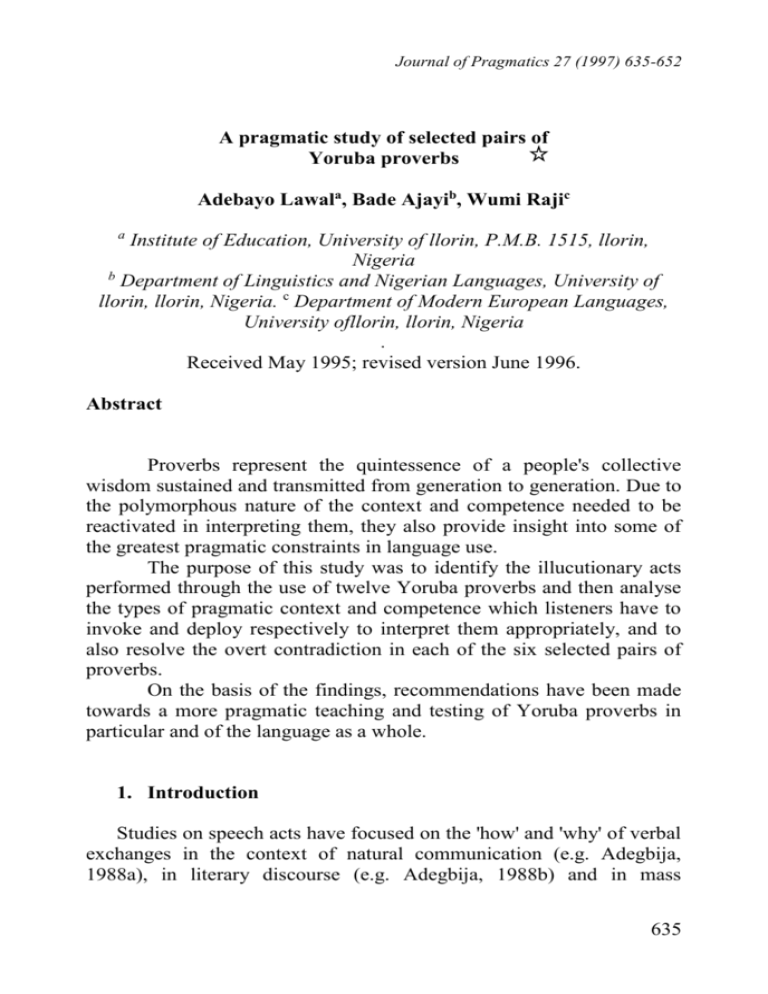
Journal of Pragmatics 27 (1997) 635-652 A pragmatic study of selected pairs of Yoruba proverbs Adebayo Lawala, Bade Ajayib, Wumi Rajic a Institute of Education, University of llorin, P.M.B. 1515, llorin, Nigeria b Department of Linguistics and Nigerian Languages, University of llorin, llorin, Nigeria. c Department of Modern European Languages, University ofllorin, llorin, Nigeria . Received May 1995; revised version June 1996. Abstract Proverbs represent the quintessence of a people's collective wisdom sustained and transmitted from generation to generation. Due to the polymorphous nature of the context and competence needed to be reactivated in interpreting them, they also provide insight into some of the greatest pragmatic constraints in language use. The purpose of this study was to identify the illucutionary acts performed through the use of twelve Yoruba proverbs and then analyse the types of pragmatic context and competence which listeners have to invoke and deploy respectively to interpret them appropriately, and to also resolve the overt contradiction in each of the six selected pairs of proverbs. On the basis of the findings, recommendations have been made towards a more pragmatic teaching and testing of Yoruba proverbs in particular and of the language as a whole. 1. Introduction Studies on speech acts have focused on the 'how' and 'why' of verbal exchanges in the context of natural communication (e.g. Adegbija, 1988a), in literary discourse (e.g. Adegbija, 1988b) and in mass 635 Journal of Pragmatics 27 (1997) 635-652 communication (e.g. Adegbija, 1982). As far as our knowledge is concerned, little or nothing has been investigated in the area of the pragmatics of proverbs with a view to understanding the 'how' and 'why' of using them, and how insights gained can enrich the theory of pragmatics in general. This neglect is unfortunate since proverbs, by their polymorphous nature, can shed more light on linguistic performance and thus extend the current frontiers of pragmatic theory. In the words of Lawal (1992b), proverbs seem to contain the richest pool of pragmatic factors since a proverb, properly contextualized, provides data that are at once linguistic, philosophical, psychological and cosmological. Proverbs thus exeit some of the greatest pragmatic constraints on language users. This is particularly true of Yoruha language in which the proverbs are not only legion and multifarious, each with its own distinctive pragmatics of usage, but where also the presence of overtly contradictory pairs of proverbs accentuates the problem. The appropriate use and interpretation of proverbs, therefore, represent some of the greatest difficulties experienced by most learners of Yoruba as a first language (LI) at all levels of the Nigerian school system, and particularly as a second Nigerian Language (NL2) at the Junior Secondary school level. The puipose of this study was to analyse the pragmatic factors underlying this problem using six overtly contradictory pairs of Yoruba proverbs with a view to suggesting useful pedagogical directions. The study was therefore a descriptive one, employing a qualitative analysis of the pragmatic mappings which competent users deploy to unravel the hidden meaning of each proverb, and to resolve the superficial contradiction that subsists between the pairs of proverbs. In addressing this research problem, the investigators sought answers to the following questions: 1. What kinds of performatives are the selected proverbs? 2. What types of context and corresponding competencies are invoked to resolve overt contradictions in the selected pairs of proverbs? As a corollary, we note the implications of answers to these questions for the teaching and learning of Yoruba proverbs in both the LI and NL2 situations.1 636 Journal of Pragmatics 27 (1997) 635-652 2. Theoretical background The background of the literature on pragmatics, especially on speech act theory, and on the functions and sources of Yoruba proverbs has provided useful insights for formulating a conceptual framework and the methodology for this study. 2.1. Functions and sources of Yoruba proverbs Proverbs form a great part of a people's traditional repository of what they consider to be of great value and concern to them. They are the quintessence of a people's collective wisdom sustained and transmitted from generation to generation (Lawal, 1992b). Thus, among the Yoruba there are proverbs about proverbs, one of which claims that "proverbs arc the veritable horse that conveys one safely to the discovery of ideas". Achebe, in his popular novel Things fall Apart, has also asserted that "among the Ibo, the art of conversation is regarded very highly and proverbs are the palm-oil with which words are eaten" (1980:5). The stylistic import of proverbs, as suggested by Achebe, can be seen in their rhetorical and poetic vigour, and this would perhaps explain why a traditional African would constantly punctuate his speech with appropriate proverbs and aphorisms to drive his points home (Lawal, 1992b). Among the Yoruba, proverbs taste sweetest in the mouths of very old people. This is not, however, implying that younger ones cannot use proverbs in their speeches, but they have to defer to, and seek permission from elders present, saying: "I bow to you elders; it wants to go the way of proverbs ...". And the elders will grant him permission, blessing him: "May you live long to use more proverbs". Proverbs are thus employed to reinforce and sustain the traditional respect for elders. In this regard, it also serves as a potent means of social control. In settling quarrels and disputes, a proverb comes in handy: "It is only he who is knowledgeable in words and proverbs that can settle quarrels'". Again, the traditional deference to elders is here underscored. The aesthetic qualities and functions of proverbs can be gleaned from their different poetic techniques. There are certain stylistic devices such as the foregrounding of sound, imagery and diction which are not common in ordinary usages. This explains the intellectual, emotional 637 Journal of Pragmatics 27 (1997) 635-652 and imaginative appeals of several Yoruba proverbs. Hence, another proverb claims that "the agidigbo drum is sounded like proverbs; it is only the wise that can dance to its rhythm, and the knowledgeable (in words) that can interpret its message". Yoruba proverbs also serve didactic functions, especially for the younger generation. This is why level-headed youths crave the company of elders so that they can glean linguistic, cultural and historical information usually conveyed in elders' speeches which, as indicated earlier on. are full of appropriate proverbs. As the proverbs go, "it is the old mouth that knows the ripeness of kola" and "any youth that washes its hands clean shall dine with elders". A cursory examination of the contents of even a small number of Yoruba proverbs would reveal an eclectic socio-cultural origin. The sources are as varied as the historical, social and cultural experiences of the Yoruba people. The significance of historicity, for instance, can be seen in this proverb: "Greeting is something but taunting another thing; we do not greet a man by calling him an Ijaye man passing through the frontage of Ogunmola's house". This proverb contains a historical allusion to the Ijaye war of the early 1860's and the historic role of Ogunmola in the war. Perhaps the greatest number of Yoruba proverbs are minted from the socio-cultural realities of traditional Yoruba experience. Hence, "as soon as the suitor wins the consent of his woman, the match-maker must withdraw his services", and "inheritors cannot be likened to true heirs". In addition, "the slave dies without the knowledge of the mother, but pandemonium greets the death of the freeborn". This last one would seem to be equivalent in pragmatic function to the Shakespcarean coinage; "When beggars die there are no comets seen; the heavens themselves blaze forth the death of princes" (Calpurnia in Shakespeare's Julius Caesar, Act III, Sc. ii.). Within the realm of socio-cultural experience, the Yoruba religious and moral ethos is perhaps the richest sub-source. Some of the proverbs derived from this area include: "If my deity cannot support me, he should leave me as he met me"; "Our character is deity, the more positive it is, the more supportive"; and "No deity .supports the indolent; it is our arms that support us". These last two proverbs would seem to echo the English equivalent which claims that "character is fate". 638 Journal of Pragmatics 27 (1997) 635-652 There are a handful of Yoruba proverbs that manifest deep psychological penetration and an understanding of animal behaviour. Two examples of these are "Human beings never assist in licking your hands when they are smeared with blood, except when they are shimmering with palm-oil"; and "a sheep that keeps the company of dogs must eat faeces", in other words, "show me your friends and I will know whom you are". Certain lines of divinatory and incantatory poetry have come to stay as widely accepted proverbs among the Yoruba. Due essentially to their poetic origin, this category of proverbs displays philosophical profundity and a keen sensitivity to the environment. For instance, "when the wood-insect gathers sticks, on its own head it carries them, in the same way as "the ash must trail whoever blows it", and "the earth shall consume those who betray it". 2.2. Theoretical models of pragmatics There are as many definitions of pragmatics as there have been attempts by prag-maticians to shed light on the nature of the discipline one of the youngest in the widening field of linguistic inquiry. It is significant to note that pragmatics emerged as a result of the limitations of structural semantics to capture satisfactorily the sociological and other non-linguistic dimensions of verbal communication, just as sociolinguistics, the fore-runner to pragmatics, evolved as a result of the inadequacy of structural linguistics to explicate the factors of linguistic performance. Just as the goal of the grammarian is to describe what constitutes grammatical competence, the concern of the pragmatician is to describe, in adequate terms, the components of the language user's pragmatic competence. As the foremost proponent of speech act theory, Austin (1962) postulates that engaging in a speech act means performing the complementary acts of locution, illo-cution and perlocution. A locutionary act is a sentence uttered with a determinate sense and reference, an act performed in order to communicate. The study of locutionary act is the domain of descriptive linguistics which comprises phonetics, syntax, phonology and linguistic semantics. An illocutionary act is a non-linguistic act performed through a linguistic or locutionary act. Illocutionary acts include commanding, daring, nominating, 639 Journal of Pragmatics 27 (1997) 635-652 resigning, etc., and can be effected through performative sentences, whether or not they contain performative verbs (Fromklin and Rod-man, 1983). For instance, "it is raining" is an implicit performance of 'stating' even when the sentence contains no performative verb. A perlocutionary act results from a language user's utterance and, according to Levinson (1980), it is the intended or unintended consequence of, or reaction to what is said. This act is not part of the conventional meaning of the utterance, but it is derived from the context and situation of the utterance. This implies that interpreting utterances is more than just recognising the speaker's intention by following the convention of verbal communication. In an attempt to improve on Austin's effort, Searle (1976) puts forward a taxonomy of illocutionary acts as 'assertives', 'directives', 'commissives', 'expressives' and 'declaratives' which are not radically different from Austin's. However, Searle disagrees with the distinction between 'locutionary' and 'illocutionary' acts, while at the same time arguing that speaking a language involves performing acts according to two types of rules - regulative and constitutive. Regulative rules "regulate antecedently or independently existing forms of behaviour" (Searle, 1976: 33), and in Adegbija's view, they are the basis of appraisal of behaviour. Constitutive rules, on the other hand, do not merely regulate, they create or define new forms of behaviour. It is thus "a matter of convention" (Adegbija, 1982: 37) for speech acts to be performed in a language. Grice (1975) proposes the term 'Cooperative Principles' (CP) to refer to the quasi-interactional agreement which speakers enter into as they perform speech acts, assuming that other things are equal. The concepts of 'implicature' and 'presupposition' are important in analysing the meaning of language in use. Implicature is the mid-way between what is said and what is implied but not entailed or stated overtly. It could be conventional (Leech, 1983) or conversational (Grice, 1978), which is the purview of pragmatics. Presupposition, on the other hand, is the explicit assumption about the real world which speakers make and on which the meaning of an utterance largely depends. Fairly related to the notions of 'implicature' and 'presupposition' is the concept of 'Mutual Contextual Beliefs' (MCBs) proposed by Bach and Harnish (1979). According to the two scholars, MCBs centre around the speaker's 'intention' and the listener's 'inference'. A speech 640 Journal of Pragmatics 27 (1997) 635-652 act is performed with the intention that the listener will be able to understand and identify the intention of the speaker. When this happens, the listener makes an inference; in other words, the listener puts certain facts together that will help him recognise the speaker's intention. These facts, which are salient or well-known to the interlocutors, are branded MCBs. Adegbija (1982) undertakes a seminal critique of the earlier speech act theoretical models, observing that most of these models have placed undue premium on convention as the decisive factor in identifying and interpreting the illocutionary force of an utterance. He argues that, although Searle suggests that intention is also crucial in interpreting illocutionary force, Searle's theory is biased in favour of conventional or constitutive rules. Adegbija further appraises Saddock's (1974) submission, concluding that Saddock takes full cognizance of linguistic convention but neglects other crucial aspects of a situation of verbal interaction such as intention and the pragmatics of the situation of social interaction. Adegbija further agrees with Bach and Harnish (1979) that understanding speech acts is in the main an inferential process. He also supports Austin's (1962) and Searle's (1976) argument that language users perform acts with utterances. He also points out that the effects of perlocutionary acts, whether intended or unintended, may be on the speaker himself as well as on the listener. Adegbija stresses the conventional aspect of speech acts, maintaining that while illocutionary acts may be conventional, as proposed by Austin (1962) and Searle (1976), they need not be. This is because the force of some illocutionary acts is determined by the intention of the speaker or by the pragmatics of the particular situation of social interaction. He then concludes that at every stage of the discourse, both speakers and listeners have to mobilise appropriate areas of what he terms their "pragmasociolinguistic competence" which refers to the constitutive pragmatic, social, syntactic, semantic and lexical competencies, among others. Adegbija, like Bach and Harnish (1974), also points out that non-literalness results in ''Indirect Speech Acts" which cannot be thorougly understood until the "pragmasociolinguistic context" is provoked. Writing from a pedagogical and communicative point of view, Lawal (1992) attempts an idealisation of the bipolar process of communication in his 'pragma-communicative' model. He argues that in 641 Journal of Pragmatics 27 (1997) 635-652 encoding and decoding meaning with language, the closer the pragmatic/communicative competencies of the interlocutors, the greater the chances of fluent and efficient communication and, conversely, the lesser the chances of misunderstanding. Since no two users of any language are exactly the same in their pragmatic competencies, the meaning intended by the encoder may not always be the same as the inference drawn by the decoder. Lawal further expresses preference for the use of 'listener' instead of Adegbija's 'hearer', since hearing as a quantitative biological function is a necessary but not sufficient condition for listening, a qualitative, psycholinguistic and pragmatic skill. Adegbija's (1982) use of 'pragmasociolinguistic competence' would also seem superfluous as it is now clear that a language user's pragmatic competence is an all-subsuming construct comprising the linguistic, the social and situational aspects of his knowledge, among others. Thus the concept of 'pragmatic competence' is deemed sufficient and allencompassing to capture all aspects of the knowledge which competent language users deploy to encode and decode meaning in linguistic communication. 3. A conceptual framework for this study The background literature on the functions and sources of Yoruba proverbs and on the existing theoretical models of pragmatics have assisted in distilling a pragmatic framework for this study. Considering the uniqueness of the data for this study, no single pragmatic model was considered adequate and an eclectic approach is adopted in arriving at a synthesized framework. In the view of Levinson (1980), the main issue which any pragmatic theory must explain is speech acts, along with presuppositions and implicatures. But beyond this, the theory must also attempt a description of the background competencies which language users reactivate to interpret speech acts, along with presuppositions and implicatures. It is only then that such a theory can serve the necessary diagnostic. developmental and remedial purposes in the sphere of language and literary education, part of which was the concern of this study. 642 Journal of Pragmatics 27 (1997) 635-652 Fig. 1. Lawal's model of the aspecis of a pragmatic theory. The model in Fig. 1 assumes that there are five hierarchical contexts of an utterance, the first and most fundamental of which is the context of language itself in terms of the phonological, lexical and syntactic components and the structure of the sentence. This context is a sine qua non of linguistic communication, and is followed by the situational context which refers to the topic of discourse and the factors of the physical event including concrete objects, persons and location. The psychological context, largely deriving from the preceding context of situation, refers to the background of the mood, attitudes, personal beliefs, and the state of mind of the language user. Next is the social context wich is concerned with interpersonal relations among the interlocutors. The penultimate level of context is the 'sociological' and this describes the socio-cultural and hislorical settings. The ultimate and broadest context is the 'cosmologicar by which is meant the language 643 Journal of Pragmatics 27 (1997) 635-652 user's world-view, and the implicit references to the world or aspects of it, and to certain universally established facts. (Note that the broken lines in the hierarchies of contexts and competencies indicate that the levels are not neatly compartmentalised, since they are not mutually exclusive.) The various levels of context are symmetrically related to the equally hierarchical levels of background knowledge or competence necessary for the production and interpretation of speech acts. The competence includes, in a fairly cumulative order, the linguistic (wich involves lexical, phonological, morpho-syntactic and micro-semantic knowledge), the psychological (i.e. awareness of, and sensitivity to moods, attitudes and points of view), the situational (which refers to the knowledge of, and familiarity with the topic of discourse, location, objects and persons in the physical setting), the social (knowledge of social factors and principles governing conversation), the sociological (knowledge of the socio-cultural and historical background to the utterance) and the cosmological (which is the language user's knowledge of the world, his factual knowledge and general worldview). Some or all of these competencies can be employed as pragmatic mappings to interpret and classify an utterance into a particular type of speech act and to give an appropriate response or reaction. In performing this complex task, the language user deploys his competencies to identify and understand presuppositions, implicatures and MCBs through inference. Speech acts are also hierarchically organised and are somewhat related to the contexts and competencies that produce them. The most basic act is locutionary and its identification and comprehension depends on the purely linguistic constraints of the lexical, morpho-syntactic, phonological, phonetic and micro-semantic structure of the sentence. Locutionary acts are thus described in our model as the speaker's overt linguistic behaviour and the competence and context relative to their interpretation are also referred to as the 'surface structures'. In consonance with the background literature earlier reviewed, it is inferred that illocutionary act is a higher-order act which can be either direct or indirect, intended or unintended and conventional or nonconventional, depending on the highly variable vagaries of the context of communication. Illocutionary acts occupy a primary level of non644 Journal of Pragmatics 27 (1997) 635-652 linguistic functions which language users perform with words. The ultimate level of speech acts is that of perlocutionary acts which are the conventional or unconventional, intended or unintended consequences of utterances. 4. Data analysis and results The proverbs that constitute the data for this study were collected from informants who were adult native speakers of the language, and also from literary texts. They are hereby presented (in both their original and English versions) in what looks like contradictory pairs. In translating, effort was made to preserve as much as possible the original point of view, although it was still difficult to recapture the original freshness and flavour. Each proverb is analysed pragmatically by stating both the 'direct' and 'indirect" illocutionary acts it performs, and then the contexts/competencies needed for interpretation are briefly outlined before showing how contexts and competencies reveal the lack of contradiction. The contextual and functional dis-tincliveness of each proverb is thus underscored. (la) Irin ti a rin la a ko ni 'It's the way a person presents himself that he's received llhcutionary act: (a) direct: assertive (claiming) (b) indirect: expressive (blaiming) Contexts/competencies Linguistic: This level of context/competence is fundamental. The core and the most unifying, however, of all the linguistic levels is the semantic. As applicable to (and will therefore be taken for granted for) all the other proverbs, it is 'meaning' that unites the lexical, syntactic and phonological levels. There are, however, two levels of semantic meaning at either the lexical or sentential level: the primary or literal level and the secondary 645 Journal of Pragmatics 27 (1997) 635-652 or idiomatic/figurative level. The primary lower level feeds the secondary higher level through what would seem a fundamental and tacit assumption by all competent users that every proverb is an idiom of a sort, a tighly condensed representation of a fairly comparable and rather large group of possibilities of socio-cultural experience. 'Linguistic meaning' is thus transferred in part to 'pragmatic meaning' through the use of such figurative devices as metaphor, metonymy, synecdoche and symbolism. In the first proverb above, for instance, the literal translation of Inn is 'manner of walking'. But at the figurative level a person's gait metaphorises into his or her general carriage, comportment and conduct. Hence, what is presented as the English version of this proverb, and indeed many of the other eleven proverbs, is not a literal but an idiomatic equivalent, at which every competent user of the language is expected to arrive as the first major sign-post to a pragmatic interpretation. Situational: A person has presented himself in a shabby, unbecoming manner and the topic centres around this. Psychological: The speaker disapproves of the way another person has presented himself, and this other person is expected to be aware of the disapproval. Social: Knowledge of the social relations holding between the two people directly involved in the event (e.g. friend-friend, parent-child, husband-wife relationship), although no special relationship need hold in this case. Sociological: The Yoruba value decent and respectable appearance/company. Cosmological: Awareness of the fact that appearance is often used as a measure of a stranger's worth. (Ib) Aso nla ko ni cniyan rila. 'A big dress does not make a person important.1 llhcutionary act (a) direct: assertive (stating) (b) indirect: verdictive (judging) Context / compete n cies 646 Journal of Pragmatics 27 (1997) 635-652 Linguistic: Again, there is a fundamental semantic requirement of understanding that 'dressing' serves as a metonym, or even a synecdoche, for personal worth as a whole. Situationai. A person of questionable character passes himself off as a dignitary through mere impressive appearance and the topic focuses on him. Psychological: The speaker disapproves of this false appearance and the listener is expected to be aware of this. Social: Knowledge of relationship between the speaker and the object of disapproval, although no type of relationship need exist. Sociological: Knowledge of the Yoruba traditional disapproval of all manner of falsehood and dcceptiveness. Cosmological: Knowledge of the human capacity for deceit and make-believe. The seeming contradiction between proverbs (la) and (Ib) can now be resolved by mapping certain contextual variables with the convergent meaning of the two proverbs. While the psychological context of disapproval is common to the two proverbs, the situational contexts would seem to be fairly opposite to each other, and the aspects of the sociological (or socio-cultural) and cosmological competencies to be invoked in appreciating the pragmatic validity of each proverb in its own right, and in resolving the seeming contradiction are radically different. This would explain the difference in the indirect or intended illocutionary force of the two proverbs. The 'new' meaning that now emerges from a harmonious blending of the two proverbs is that, although appearance may be deceptive, it is still desirable that we present ourselves decently and respectably. (2a) Otosi egbon mi jogun aburo, Olorfburuku baba nn joguri omp. ‘It is only the pauper that inherits the possessions of his younger ones, just as the never-do-well inherits his own children's properties.’ Illocutionary act: (a) direct: assertive (claiming) (b) indirect: expressive (blaming) 647 Journal of Pragmatics 27 (1997) 635-652 Context/Competencies: Linguistic: The interpreter needs to appreciate the metaphorical use of baba (father) and omo (child) as referring to any elder person and a younger one respectively, in a relative sense. Sit national: A person assumes wrongful ownership of something belonging to another much younger person. Psychological: The speaker's mood is that of disapproval and the listener is expected to know this. Social: No special relationship is requisite for both the direct and indirect (or intended) illocutionary acts. Sociological: Among the Yoruba, age confers both respect and responsibility on a person. In addition, the wish of the traditional Yoruba man is that his children outlive him and inherit his belongings. Cosmological: The idea of inheritance suggests a weaker or younger person enjoying the fruits of the responsibility and labour of a dead person assumed to be older or more dependable. (2b) K 'omo to jogun, ma a joghon. 'Before a child inherits my properties, I myself will have consumed thirty of them.’ Illocutionary act: (a) direct: commissive (vowing) (b) indirect: directive (advising) Contexts! competencies Linguistic: To ensure basic competence in the semantics of the sentence, the listener needs to understand the significance of the polysemic pun on jogun, meaning 'inherit' and1 also 'eat twenty', the two of which are simultaneously valid for interpretation at the nonpragmatic, sentential level. Furthermore, at the idiomatic level 'child' would not be misconstrued only literally in a biological sense, but figuratively as referring to any much younger person. Sttuational: A younger person relies on what he expects the speaker to pass on to him in terms of material objects, instead of working hard to uplift himself. 648 Journal of Pragmatics 27 (1997) 635-652 Psychological: The speaker disapproves of the younger person's expectation and expects the listener(s) to understand this. Social: A special relationship of either parent-child, older siblingyounger sibling, master-slave, etc. is necessary here for the intended illocutionary force of the proverb. Sociological: Knowledge of the premium1 which the Yoruba place on self-achievement. Cosmological: The general belief that people hardly appreciate undeserved reward. The apparent contradiction between proverbs (2a) and (2b) can also be resolved quite easily once we appreciate the fact that they only have a similar psychological context of disapproval, but are distinctively dissimilar in their social, situational, sociological and cosmological contexts of use, and the concomitant competencies requisite for their interpretation as mutually independent speech acts. The two proverbs work together congruently to underscore an aspect of the cosmological vision of the Yoruba which affirms that parents and other adults should leave behind for the younger generation worthy material (and moral) heritage, but the latter should strive hard for their own independent achievements by starting off wherever their forebears stop. (3a) Bi okete ba dagba tan, omu omo re nf i mu. 'When okete (a nocturnal rodent) becomes very old, it sucks the breasts of her own children.' Illocutionary act: (a) direct: assertive (informing) (b) indirect: directive (advising) Contexts/ competencies: Linguistic: The personification of okete, a nocturnal rodent, as a special type of metaphor must be understood, while 'breasts' and 'sucking' must also be jointly interpreted as symbolic of dependency. In addition, the meaning of 'child' must be extended beyond, the primarily biological to cover just any younger individual. Situational: The speaker reacts to the listener's refusal to accept a gift from a much younger person, or, more typically, the older person attempts to justify his demands on the younger individual. 649 Journal of Pragmatics 27 (1997) 635-652 Psychological: The speaker disapproves of the listener's refusal and he expects him to understand this. Social: A relationship of either friendship, kinship or acquaintanceship exists between the interlocutors. Sociological: Knowledge of the Yoruba traditional expectation of filial concern and care for one's aged parents and other old relations. Cosmological: The fact of the common reciprocity of filial and parental love. 3b Ikun omo eni la ti ri ri ayo. 'It is in the tummy of her baby that a mother satisfies her own hunger.' Illocutionary act: (a) direct: assertive (informing) (b) indirect: directive (recommending) Contexts! competencies Linguistic: As before, 'baby' and 'mother' are not to be understood in their primary, literal senses but each as a lexico-semantic short-hand that potentially translates into several socio-cultural possibilities on the pages of experience. Situational: A mother breast-feeding her baby suddenly remembers that her own meal is long over-due. The Speaker approves of the mother's parental concern and attempts to reinforce the act of maternal self-denial. In essence, and more importantly, an older person denies himself or himself on account of a younger fellow. Psychological: The speaker is happy about the situation and expects the listeners to understand this. Social: A relationship of either friendship, acquaintanceship or kinship holds between the speaker and the addressee. Sociological: Knowledge of the immense importance the Yoruba attach to children. Cosmological: Knowledge of the universality and incomparability of material love and devotion. Proverbs (3a) and (3b) would seem to be performing the same intended, indirect illocutionary function but in opposite directions and in different situationaL psychological, sociological and cosmological aspects of the pragmatic context. The philosophical implication of the mutal inclusiveness of the two proverbs is that the Yoruba expect 650 Journal of Pragmatics 27 (1997) 635-652 children to take care of their aged parents and relations in the same way parents and old relations take care of their young children and wards. The two proverbs therefore represent, in philosophical and sociocultural terms, two sides of the same coin. (4a) Igi kan 16 da igbo se. 'One tree cannot make a forest.’ Illocutionary act: (a) direct: assertive (claiming) (b) indirect (warning, advising) Contexts / competencies Linguistic: An understanding of the possible personification of igi (tree) and Igbo (forest) respectively is fundamental here. Situational: A person over-estimates his worth, strength and independence within a group. Psychological: The speaker frowns at this and wants the listener to know so. Sociological: The Yoruba traditional expectation of personal modesty and humility irrespective of one's worth. Cosmological: Knowledge of the need for a person to be sensitive to the norms of his environment, since a person's individuality derives from his group. (4b) Okan soso araba o ya ju egbeegberun psuhsuh 'A single mahogany tree is better than a thousand osu/mm (a tall, grass- like type of plant) Illocutionary act: (a) direct: assertive (claiming) (b) indirect: verdictive (assessing) Contexts/ competencies Linguistic : The same type of idiomatic competence required in (4a) also applies here. 651 Journal of Pragmatics 27 (1997) 635-652 Situational: A person, well-known to the interlocutors, has several children but none is worthy of being proud of, and the interlocutors are discussing the father and his children. Physchological: The speaker wishes to express his disgust at the worthlessness of all the man's children. Social: A relationship of friendship, kinship or acquaintanceship exists between the interlocutors. Sociological: The Yoruba traditional appreciation of the moral, intellectual and emotional worth of the individual. Cosmological: Knowledge of the common tyranny of the majority and the possible stifling of individual self-expression. Again, these two proverbs are contradictory only at the overt 'linguistic' level, and the seeming incompatibility can be removed if we apply in particular the pragmatic mappings of the specific situational, psychological, sociological and cosmo-logical aspects of the general functional contexts of the proverbs. The salient philosophical point here is that, while it is essential for an individual to be mindful of the dictates of his environment, the society must also respect the individuality and uniqueness of the person and grant him adequate room for selfactualisation. In essence, the dialectical axiom that the individual determines the collective, and vice-versa, is the joint thrust of the two proverbs. (5a) Orisa boo gbe mi, fi mi sile bo o ti ba mi. 'If my deity cannot support me (in times of need), it should leave me as it met me.' Illocutionary act: (a) direct: assertive (complaining) (b) indirect: declarative (rejecting) Contexts/competencies: Linguistic: The listener is expected to appreciate the crucial fact that orisa (deity) is only used as a symbol of all sources, both human and non-human, of support and benevolence. Situational: A friend, acquaintance, associate or supporter is found to be disloyal or non-supportive especially at critical times and the speaker complains about him. 652 Journal of Pragmatics 27 (1997) 635-652 Psychological: The speaker feels strongly averse to the person's disloyalty and he wants the listener (possibly the disloyal individual) to know this. Social: A close relationship exists between the interlocutors. Sociological: Knowledge of the Yoruba belief in the deities and the mutal expectations between man and the gods. Cosmological: A measure of magnanimity and support is expected from an object of religious devotion. (5b) Orisa to n'gbe die kd si; apa eni nil gbe ni. 'No deity supports the loafer; it is a person's arms that can support him.' lllocutionary act: (a) direct: assertive (claiming, informing) (b) indirect: (directive, advising) Contexts! competencies: Linguistic: The listener is still expected to interprete onset (deity) as done in (5a), and to further appreciate the semantic functions of apa (arm) as both a synecdoche and a symbol. Situational: A lazy man blames God for his woes, and the speaker condemns this. Psychological: The speaker is opposed to this attitude to life and wishes the idler to know this. Social: A close relationship exists between the interlocutors who both know the lazy man, at least fairly well. Sociological: Knowledge of the Yoruba belief in hard work as an antidote for abject poverty. Cosmological: Knowledge of the possibility of a person's character being instrumental to his fate. This pair of overtly contradictory proverbs can be explained particularly in terms of familiarity with, and competence in certain aspects of the situational, psychological, social, sociological and cosmological contexts which give pragmatic relevance to each as a meaningful, independent illocutionary act. The moral point being underscored here is that, while one may expect support and assistance from 653 Journal of Pragmatics 27 (1997) 635-652 both human and superhuman figures, the surest and most crucial support is from the self. (6a) Bi iro ba lo logiin odun pjo kan ni otitp yo b ba a. 'If a he runs for twenty years, it takes truth just a day to catch it.' Illocutinary act: (a) direct: assertive (claiming) (b) indirect: verdictive (evaluating) Contexts/competencies Linguistic: The personification of iro (lie) and dtito (truth) and the rhetorical use of 'twenty years' and 'a day' respectively need be specially appreciated. Situational: A long-concealed lie has just been revealed and the speaker expresses this new awareness to his listener(s). Psychological: The mood is that of pleasant surprise and moral disillusionment. Social: The interlocutors are so close to have both been 'imprisoned' for so long in the darkness of the lie. Sociological: The Yoruba traditional observation concerning the seeming elusive-ness and the relatively short span of lies which are also considered a vice. Cosmological: Knowledge of the fact of the enduring nature of truth. (6b) Ki ile to pa osika, ohun re re yo 6 ti baje. 'Before the earth consumes the evil-doer, have been destroyed.' good things will Illocutionary act: (a) direct: assertive (claiming) (b) indirect: directive (advising, recommending) Contexts/competencies 654 Journal of Pragmatics 27 (1997) 635-652 Linguistic: A unique pre-requisite here is the personification, or rather the deification of He (land) which is symbolized as the final judge. Situational: An evil-doer is identified for what he is and the speaker wants his lis-tener(s) to know this. Psychological: The speaker is unwilling to continue tolerating the evil doer and he wants to win his listeners to his side. Social: The speaker and his lister(s) are socially close to the extent that their continued tolerance of the evil-doer may have a negative consequence on all of them. Cosmological: Justice delayed is, at best, incomplete justice. The moral point in these two apparently contradictory proverbs is that truth always outlives falsehood, but for as long as it lives, a lie, like any other vice, destroys both the liar and his victim(s), and eventual awareness, though inevitable, may prove too late. The illocutionary forces of the proverbs are different and this partly explains the differences in the specific aspects of the context that need to be resorted to in meaningfully interpreting each and in resolving the superficial, mutual negation. In other words, the incompatibility is only contextual, not philosophical. 5. Concluding remarks The findings of this study, apart from answering the research questions earlier raised, could go a long way in extending the frontiers of pragmatic theory and in shedding more light on the communicative and ethical significance of proverbs especially among the Yoruba. From the foregoing analysis of the twelve proverbs, it can be inferred that the 'direct' performative/illocutionary force of Yoruba proverbs tends to be mainly 'assertive' through either claiming, disclaiming, informing or complaining about certain aspects of both the physical and the subjective world. A relatively small amount of the proverbs are 'commisive' in their 'direct' illocutionary force by vowing, pledging or promising something to someone. In pragmatic terms, and within the framework of our model, these 'direct' illocutionary acts of assertion and commission are only foundational to the higher, 'indirect' 655 Journal of Pragmatics 27 (1997) 635-652 acts which require the activation of other competencies beyond the linguistic. The major 'indirect' illocutionary forces, which happen to be intended acts the proverbs are used to perform, vary and include the 'expressive' act of blaming, the 'directive' ones of advising, recommending and warning, and lastly, but quite significantly, the 'verdictive' acts of judging, assessing and evaluating. It can thus be safely inferred that the proverbs perform illocutionary acts that are conventional and intentionally indirect. The findings seem to suggest that the intended illocutionary force of the proverbs serves as an ethical mechanism for regulating human behaviour and enhancing social control. Essentially, therefore, the Yoruba proverbs, perhaps like proverbs in other languages, represent a veritable tool for affecting and effecting desirable action, and for projecting a particular cosmology. In understanding the intended illocutionary functions of Yoruba proverbs, the language user employs certain competencies (linguistic, situational, social, psychological, sociological and cosmological) to identify, map and match the corresponding contexts of use with the meaning. Effective use of the proverbs is thus not a question of either intention or convention, but of an intricate blend of the two. Thus, in line with our model, conversational implicatures and presuppositions, which are aspects of the MCBs, are related and instrumental to the 'indirect' illocutionary force of the proverbs. These MCBs are not located in the 'surface structure' of the 'linguistic context' but in the progressively deeper structures of the situationa!, psychological, social, sociological and cosmological contexts. It is also in the deeper networks of context and competence relative to the pragmatics of each proverb that the seeming contradictions between certain pairs of proverbs'can be resolved by identifying and employing background facts, feelings, beliefs, situations and view-points which are presupposed or implicated, as the case may be. As our previous analysis has indicated, Yoruba proverbs tend to affirm and project a world in which two antipolar extremes (e.g. good vs. evil, truth vs. falsehood, courage vs. cowardice, etc) struggle for pre-eminence and supremacy. The central philosophical point as deducible in the presence of several overtly contradictory pairs of proverbs is the pragmatic need to achieve a proportional blend of the two extemes. The Yoruba traditional world-view hints thus at a cyclic 656 Journal of Pragmatics 27 (1997) 635-652 rather than a linear perception of reality. This is why in the Yoruba proverbial system "a balanced blend of friendship and enmity sustains the world" and "knowing when to attack and when to retreat is the hallmark of a seasoned warrior; a warrior who only knows how to attack, but lacks the skills of retreat will sooner than later perish in a war other than his own".2 References Achebe, Chinua. 1980. Things fall apart. London: Heinemann. Adegbija, E.E., 1982. Speech act analysis of consumer advertisement. Unpublished Ph.D. thesis, Indiana University Bloomington. Adegbija, E.E., 1988a. Towards a speech act approach to Nigerian literature in English. Language and Style 21(3): 259-269. Adegbija, E.E.. 1988b. My friend, where is Anini?: Decoding the meaning of utterances. Journal of Pragmatics 12(2): 151-160. Some people can die to be reborn, depending on the socio-mora] texture of their activities and experiences while on earth. Hence, there are such cosmologicaily revealing names as Babatunde (Father has come again), Babarinde (Father has walked back), Babawale (Father has come back home), Malomo (Do not go again). lyabo (Mother has returned), Yetunde (Mother has come again) and Yewande (Mother has come back to look for me) among several others. 657 Journal of Pragmatics 27 (1997) 635-652 Austin, J.L., 1962. How to do things with words. Cambridge, MA: Harvard University Press, Bach, K. and R. Harnish, 1979. Linguistic communication and speech acts. Cambridge, MA: MIT Press. Fromkin, V. and R, Rodman, 1983. An introduction to language. 3rd edition. New York: Holt, Rinehart and Winston. Grice, H.P., 1975. Logic and conversation. In: P. Cole and J. Morgan, eds., Syntax and semantics. Vol. 3: Speech acts. New York: Academic Press. Lawal, R.A., I992a. The use of the English dictionary. In: Olu Obafemi. ed., New introduction to English language, 149-166. Ibadan: Y-Books. Lawal, R.A., 1992b. English language and a patriarchal woridvicw. Savanna 13(2): 74-79. Leech, G., 1983. The principles of pragmatics. London: Longman, Levin, S.R., 1977. The semantics of metaphor. London: The Johns Hopkins University Press, Levinson, Stephen C., 1980. Speech act theory: The state of the art. Cambridge: Cambridge University Press. Saddock, J.M., 1974. Towards a linguistic theory of speech acts. New York: Academic Press. Searle, J.R., 1976. A classification of illocutionary acts. Language and Society 5: 1-23. 658
